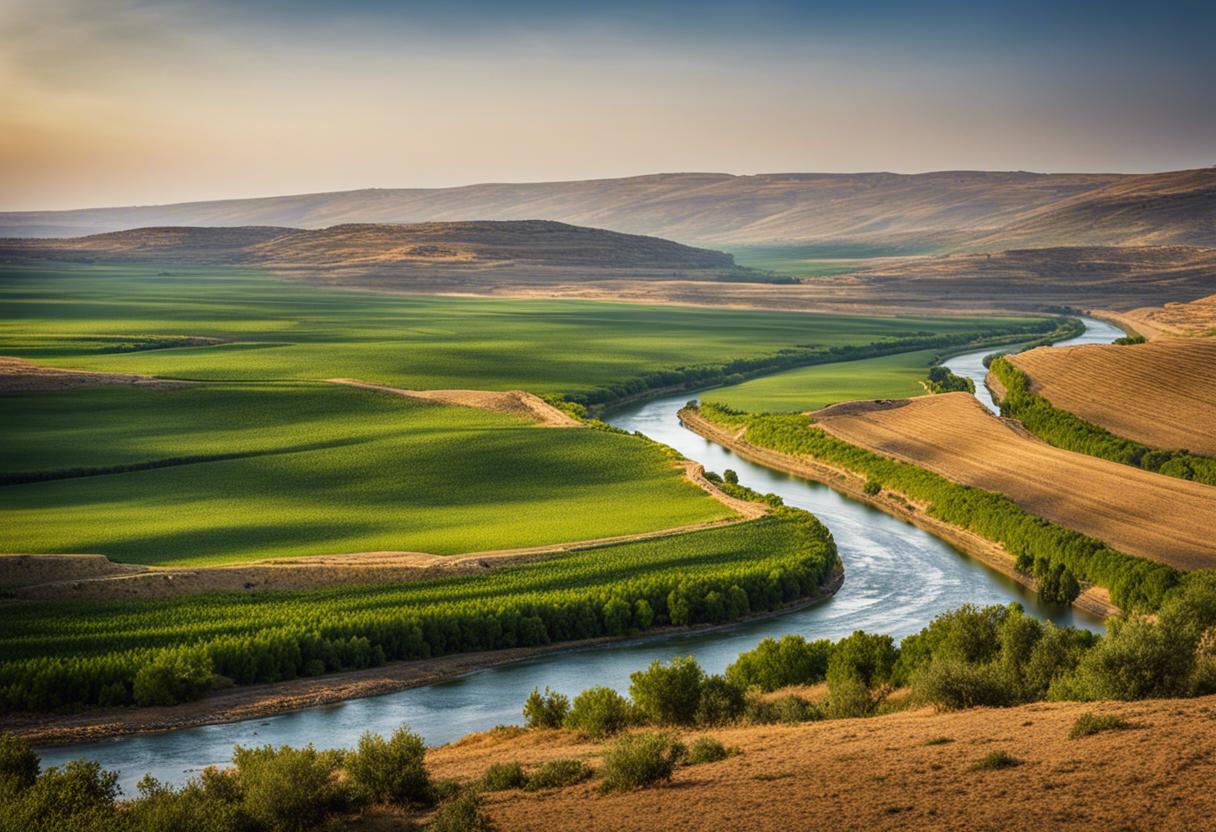The catastrophic earthquakes in Turkey-Syria in February 2023 exacerbated the plight of northwest Syrian communities, already beset by over a decade of continuous armed conflict and ongoing displacement. Nevertheless, with crucial financial support from the European Union (EU), the organisation Goal has been making great strides in equipping disaster-stricken families with piped clean water, providing a glimmer of hope in an overwhelmingly fragile situation.
“Am I not a human too?” poses Hussein, a 48-year-old father to nine children. After the earthquakes obliterated his family’s domicile in the town of Jandires in February 2023, they have been residing in the Al-Wadah displacement encampment in Northern Aleppo, Syria.
Hussein articulates the adversity that families, much like his own, face daily – the distressing absence of medical amenities, educational facilities, proper infrastructure, and above all, water and basic sanitation. “Perhaps we aren’t deemed human after all,” he ponders.
Every day, local teams from Goal interact with hundreds of families in northwest Syria, each echoing Hussein’s sentiments. Further complications arise from the onslaught of the February 2023 earthquakes, which only intensified the strain on these communities already grappling with 13 years of unending armed conflict, financial depression and the Covid-19 outbreak. The catastrophe damaged homes and essential structures, driving countless Syrian individuals and communities to the edge.
The necessity for regular access to clean water is paramount, especially in contexts riddled with instability. Alarmingly, in northwest Syria, over half of the region’s population of 5.1 million people depend on possibly contaminated water sources. The United Nations states that amongst the 2 million displaced individuals living in camps and makeshift settlements in northwest Syria, a mere 27% of households have connections to the water network, which sustains extensive damage from long-standing conflict and the recent earthquakes.
Amina, Hussein’s wife, acknowledges the significance of refraining from using potentially unsafe water, but feels impotent with no other alternatives. Since their move to the displacement camp, they have been reliant on water trucked in by independent vendors.
“The water we receive isn’t sterilised, leading to my children becoming sick frequently with diarrhoea and vomiting,” she describes.
However, even the supply of trucked water can be challenging to access at times, as rising floodwaters can obstruct the camp roads, situated in agricultural terrain. It frequently becomes the responsibility of their children to collect water from the trucks.
Mudar, a 12-year-old living in a camp with his parents, Hussein and Amina, describes the arduous task of fetching water in the rainy seasons. The downpour turns pathways into muddy messes, with over a half a kilometre separating them from the water trucks. More often than not, the gathered water is contaminated with dirt and unfit for consumption.
In times when the visit from the water vendor becomes inconsistent, Hussein and Amina often resort to unconventional methods to obtain water. In one instance, Amina gathered rainwater collected in a puddle, while Hussein confessed to using polluted roof-collected water.
Since 2014, Goal, a humanitarian organisation, has been ensuring the smooth operation of water systems across northwestern Syria, supporting conflict-ridden regions, by maintaining water pumping stations, undertaking repairs, and promoting water safety through measures such as chlorination and tests. Additionally, they assist with practical skills and provide technical help to local water infrastructure administrators.
Currently, with the financial support from the EU and other contributors, Goal is providing potable tap water to nearly 800,000 people in this region.
Over recent years, Goal has been expanding its humanitarian reach, delivering Water, Sanitation, and Hygiene (WASH) to more displaced communities living in camps and makeshift tent sites.
Post the earthquakes in February 2023, Goal redoubled their efforts, securing access to clean water for 130,000 individuals affected by the disaster. This was accomplished by revitalising and expanding water networks, building water towers and implementing solar power, which was made possible through additional EU support.
In Al-Wadah and adjacent tented settlements in Northern Aleppo, Goal’s EU-sponsored WASH activities aim to provide piped drinkable water to over 5,000 dislocated persons, many of whom lost their homes due to the earthquakes. This included implementing new pipelines that connected the camp to a water pumping station and constructing a new water tower to achieve a consistent water supply.
Hussein couldn’t contain his relief when he saw the new water pipelines in Al-Wadah being installed. He said, “Seeing the water flow from the tap after Goal tested the system was a celebration for the whole camp.”
Once the tower’s construction is finished, households in the colony will regularly receive purified drinking water through pipes from a persistent source, a vital measure against water-related illnesses. Living in times marked by relentless crises, aid agencies are facing increasingly intricate humanitarian complications, impacting a rising population. There is a pressing need for mid to long-range humanitarian strategies that transcend immediate crisis reactions. Such strategies should respond to the dynamic aspect of displacement, rendering necessary facilities to families for longer durations.
In destabilised areas like the northwestern part of Syria, with constrained public ability to counter risks, humanitarian initiatives hold critical significance in fortifying local services’ provision. Aid agencies can inspire optimism for a more promising future for the impacted individuals by guaranteeing these services’ continuity even through calamity and strife. For more than a decade, teams from Goal have been operational in Syria, extending help to defenceless communities since the conflict initiation in 2012. Further details can be found here.
This endeavour is financially supported by the European Union. The perspectives and opinions expressed are solely those of Goal and may not necessarily echo the Europan Union’s or EU Humanitarian Aid’s viewpoints. Neither the European Union nor EU Humanitarian aid should be held accountable for them.
About EU Humanitarian Aid: The European Union and its Member States rank among the leading benefactors globally of humanitarian aid. Through the European Commission’s Directorate General for European Civil Protection and Humanitarian Aid Operations, the European Union lends a hand to millions affected by conflicts and natural catastrophes annually.
For more information, visit civil-protection-humanitarian-aid.ec.europa.eu.

